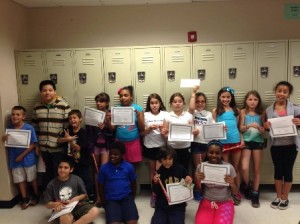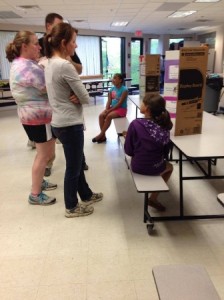
Marlborough – “I used to think engineering was hard and for grown-ups,” commented Kyle Ha, a fifth grader from Worcester, “but building a better flashlight taught me how cool it was.”
Ha was one of 108 students from seven districts who participated in the first-ever statewide science fair for elementary school students in Massachusetts.
On June 20, students from across the commonwealth gathered at the Advanced Math and Science Academy Charter School (AMSA) in Marlborough to present projects which ranged from testing which fruits generate the most electrical current to comparing the viscosity of various polymer slimes. The fair was organized by Science for Shooting STARs, a nonprofit organization that provides accessible STEM (science, technology, engineering and mathematics) education programming to K-6 students, especially those representing gender and racial minorities.
Founded in 2012 by AMSA students and Northborough residents Amol, 15, and Rahi Punjabi, 17, the program has grown from serving a dozen students in their local community

to over 500 students in 20 communities across Massachusetts. Science for Shooting STARs engages students in inquiry-driven activities and group research projects and exposes them to STEM career paths and professions.
However, what sets it apart from other STEM education initiatives is that the organization is run entirely by high school volunteers.
“Teaching students how to think like engineers gives them a skillset they can use to pursue a range of careers and make valuable contributions to our society,” noted Rahi, who will be studying at Columbia University next year.
“One of our long-term goals is to compile all our work into a sort of curriculum that can be adopted by high schoolers everywhere,” Amol added. “Then, we could bring this brand of STEM education to the millions of students who need it.”
Since January, over 20 student-mentors have been coordinating the statewide science fair program. These students worked with elementary school students who chose project topics, researched their subjects, tested their hypotheses, analyzed their data, and finally presented their findings to their peers, parents, teachers and members of the community.
Three AMSA teachers judged the presentations: Kelly Antonuccio (physics), Lisa Thibault (biology), and Jeremy Morris (engineering). Cash prizes were awarded to the top three projects.
First place was awarded to “The Crystal Clear Girls,” the team of Hailey, Sabrina, Gabby and Carol, who investigated how the type of solute affects the growth of crystals. Second place went to “The Tasters,” the team of Tara, Victor and Andre, who investigated the effect of age on the genetics of taste. “The KAY Flowers,” the team of Katie, Alexis and Yednelis, earned third place, with their exploration of the transpiration process in flowers.
Prior to the state science fair, in May three regional science fairs were held in the Boston, Worcester, and Metrowest areas. These fairs gave the students the opportunity to practice presenting their projects to judges before the state competition as well as celebrate their achievements with their families and teachers.
In the Boston region, the top prize went to “The Color Changing Carnations,” the Somerville team of Lygia, Elizabeth and Jennifer, who were mentored by Erica Budina, a graduating senior from Medford High School.
“I initially went into the program thinking that I would be teaching the kids a thing or two about science,” Budina remarked, “but it turns out that they taught me a few things about myself. They taught me how important it is to be clear about what you are trying to explain in science.”
Budina will be heading to Harvard University in the fall to study engineering.
The top Metrowest team, “The Tasters,” worked with mentor Hanna Seariac, a sophomore at AMSA.
“I didn’t exactly know what it would be like stepping into this program,” Seariac said. “My experience this year has reminded me that while I love science and that's fantastic, what is even better is sharing it with these kids.”
Science Fair judge Thibault noted the importance of the Science for Shooting STARs program.
“The state science fair celebrates and supports a lifetime love of learning, encouraging kids to learn on their own and follow their curiosity and provide inspiration for further study,” Thibault said. “After judging all the projects, I am in awe by the way high school students run this program and excite the next generation about science.”












